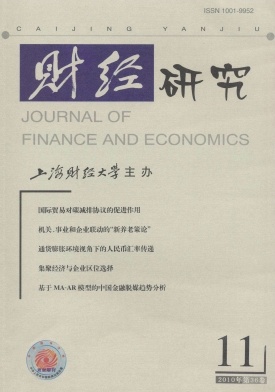政治关系能实现审计意见购买吗?——基于投资者保护视角的检验
财经研究 2010 年 第 36 卷第 11 期, 页码:105 - 115
摘要
参考文献
摘要
审计意见购买直接关系到投资者利益保护机制的实现,已经成为当前各国政府关注的重大问题。文章研究发现,整体来看,相对于没有政治关系的公司,有政治关系并不能帮助公司减小获取非标审计意见的概率,但对于前一期被出具非标审计意见的公司来说,政治关系能帮助公司对现任审计师实现审计意见购买;进一步研究发现,有政治关系的公司更倾向于选择大所购买审计意见,并且大所没有收取审计费用溢价。研究结果表明,有政治关系的民营企业不必通过审计师变更,完全可以通过关系向现任(大所)审计师购买审计意见,以减少管制成本。因此独立审计充当法律的替代机制实现对投资者的保护会受到非正式制度(政治关系)的不利影响。
[1]孙铮,刘凤委,李增泉.市场化程度、政府干预与企业债务期限结构[J].经济研究,2005,(5):52-63.
[2]边燕杰,丘海雄.企业的社会资本及其功效[J].中国社会科学,2000,(2):87-99.
[3]王?,殷宁宇.转轨时期的非正式产权保护与私营企业的发展[J].中山大学学报,2008,(5):153-159.
[4]雷光勇,李书锋,王秀娟.政治关联、审计师选择与公司价值[J].管理世界,2009,(7):145-155.
[5]杜兴强,周泽将.政治联系与审计师选择[J].审计研究,2010,(2):47-53.
[6]吴联生.审计意见购买:行为特征与监管策略[J].经济研究,2005,(7):66-76.
[7]李爽,吴溪.审计意见变通及其监管:经验证据[J].中国会计与财务研究,2002a,(4):1-28.
[8]胡奕明,周伟.债权人监督:贷款政策与企业财务状况[J].金融研究,2006,(4):49-60.
[9]陈小林,潘克勤.法律环境、政治关系与审计定价[J].财贸经济,2007,(13):90-95.
[10]陈冬华,周春泉.自选择问题对审计收费的影响[J].财经研究,2006,(3):44-55.
[11]李奇凤,宋琰纹.事务所地域与其对盈余管理的抑制能力[J].中国会计评论,2007,(1):83-94.
[12]吴文锋,吴冲锋,刘晓薇.中国民营上市公司高管的政府背景与公司价值[J].经济研究,2008,(7):130-141.
[13]李爽,吴溪.审计师变更的监管思想、政策效应与学术思想[J].会计研究,2002b,(11):32-36.
[14]陆正飞,童盼.审计意见、审计师变更与监管政策[J].审计研究,2003,(3):30-35.
[15]Jensen M,W Meckling.Theory of firm:Managerial behavior,agency costs and owner-ship structure[J].Journal of Financial Economics,1976,(3):305-360.
[16]Ross Watts,J Zimmerman.Agency problems,auditing,and the theory of the firm:Someevidence[J].Journal of Law and Economics,1983,(3):613-633.
[17]Ray Ball,A Robin,J Wu.Incentives versus standards:Properties of accounting incomein four East Asian countries[J].Journal of Accounting and Economics,2003,(36):235-270.
[18]K Chan,K Lin,P Mo.Political-economic analysis of auditor reporting and auditorswitch[J].Review of Accounting Studies,2006,(11):21-48.
[19]Wang Q,T J Wong,L Xia.State ownership,the institutional environment,and auditorchoice:Evidence from China[J].Journal of Accounting and Economics,2008,46:112-134.
[20]Choi C,Lee S,Kim B.A note on count trade:Contractual uncertainty and transactiongovernance in Transition Economies[J].Journal of International Business Studies,1999,30:189-201.
[21]Xin K.J Pearce.Guanxi:Connections as substitute for formal institutional support[J].Academy of Management Journal,1996,39:1641-1658.
[22]Fan J,T J Wong,Tianyu Zhang.Politically connected CEOs,corporate governance,andPost-IPO performance of China’s newly partially privatized firms[J].Journal of Finan-cial Economics,2007,84:330-357.
[23]S Titman,B Trueman.Information quality and the valuation of new issues[J].Journalof Accounting and Economics,1986,(8):159-172.
[24]R Bushman,J Piotroski.Financial reporting incentives for conservative accounting:Theinfluence of legal and political institutions[J].Journal of Accounting and Economics,2006,42:107-148.
[25]J Krishman,J Krishnan.Litigation risk and auditor resignations[J].The AccountingReview,1997,72:539-560.
[26]P Chaney,D Jeter,L Shivakumar.Self-selection of auditors and audit pricing in privatefirms[J].The Accounting Review,2004,79:51-72.
[2]边燕杰,丘海雄.企业的社会资本及其功效[J].中国社会科学,2000,(2):87-99.
[3]王?,殷宁宇.转轨时期的非正式产权保护与私营企业的发展[J].中山大学学报,2008,(5):153-159.
[4]雷光勇,李书锋,王秀娟.政治关联、审计师选择与公司价值[J].管理世界,2009,(7):145-155.
[5]杜兴强,周泽将.政治联系与审计师选择[J].审计研究,2010,(2):47-53.
[6]吴联生.审计意见购买:行为特征与监管策略[J].经济研究,2005,(7):66-76.
[7]李爽,吴溪.审计意见变通及其监管:经验证据[J].中国会计与财务研究,2002a,(4):1-28.
[8]胡奕明,周伟.债权人监督:贷款政策与企业财务状况[J].金融研究,2006,(4):49-60.
[9]陈小林,潘克勤.法律环境、政治关系与审计定价[J].财贸经济,2007,(13):90-95.
[10]陈冬华,周春泉.自选择问题对审计收费的影响[J].财经研究,2006,(3):44-55.
[11]李奇凤,宋琰纹.事务所地域与其对盈余管理的抑制能力[J].中国会计评论,2007,(1):83-94.
[12]吴文锋,吴冲锋,刘晓薇.中国民营上市公司高管的政府背景与公司价值[J].经济研究,2008,(7):130-141.
[13]李爽,吴溪.审计师变更的监管思想、政策效应与学术思想[J].会计研究,2002b,(11):32-36.
[14]陆正飞,童盼.审计意见、审计师变更与监管政策[J].审计研究,2003,(3):30-35.
[15]Jensen M,W Meckling.Theory of firm:Managerial behavior,agency costs and owner-ship structure[J].Journal of Financial Economics,1976,(3):305-360.
[16]Ross Watts,J Zimmerman.Agency problems,auditing,and the theory of the firm:Someevidence[J].Journal of Law and Economics,1983,(3):613-633.
[17]Ray Ball,A Robin,J Wu.Incentives versus standards:Properties of accounting incomein four East Asian countries[J].Journal of Accounting and Economics,2003,(36):235-270.
[18]K Chan,K Lin,P Mo.Political-economic analysis of auditor reporting and auditorswitch[J].Review of Accounting Studies,2006,(11):21-48.
[19]Wang Q,T J Wong,L Xia.State ownership,the institutional environment,and auditorchoice:Evidence from China[J].Journal of Accounting and Economics,2008,46:112-134.
[20]Choi C,Lee S,Kim B.A note on count trade:Contractual uncertainty and transactiongovernance in Transition Economies[J].Journal of International Business Studies,1999,30:189-201.
[21]Xin K.J Pearce.Guanxi:Connections as substitute for formal institutional support[J].Academy of Management Journal,1996,39:1641-1658.
[22]Fan J,T J Wong,Tianyu Zhang.Politically connected CEOs,corporate governance,andPost-IPO performance of China’s newly partially privatized firms[J].Journal of Finan-cial Economics,2007,84:330-357.
[23]S Titman,B Trueman.Information quality and the valuation of new issues[J].Journalof Accounting and Economics,1986,(8):159-172.
[24]R Bushman,J Piotroski.Financial reporting incentives for conservative accounting:Theinfluence of legal and political institutions[J].Journal of Accounting and Economics,2006,42:107-148.
[25]J Krishman,J Krishnan.Litigation risk and auditor resignations[J].The AccountingReview,1997,72:539-560.
[26]P Chaney,D Jeter,L Shivakumar.Self-selection of auditors and audit pricing in privatefirms[J].The Accounting Review,2004,79:51-72.
引用本文
郑军, 林钟高, 彭琳, 等. 政治关系能实现审计意见购买吗?——基于投资者保护视角的检验[J]. 财经研究, 2010, 36(11): 105–115.
导出参考文献,格式为:





 5735
5735  3034
3034

